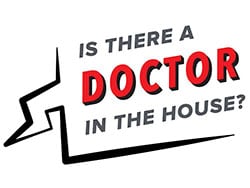
Emergencies happen anywhere, anytime, and sometimes physicians find themselves in situations in which they are the only ones who can help. Is There a Doctor in the House? is a new Medscape series telling these stories.
In 2015, two crazy things happened to me only a few weeks apart.
My family was in the Florida Panhandle near Fort Walton at Santa Rosa Beach. We were there for my mom’s 80th birthday (with her identical twin) and also our 30th wedding anniversary. We’re a medical family: My wife, Karen, has been a cardiac and critical care nurse for 30 years. One of my daughters, Stephanie, is a pediatric ICU nurse, and my other daughter, Alyssa, is a residency program manager.

Dr Richard Miller
The weather was extremely windy and dangerous for the first 3 or 4 days, with a ridiculous undertow. Finally, it calmed down a little bit, so everybody hit the beach.
Our house rental was in a private beach area with no lifeguards. Alyssa and I were swimming just past where the waves were breaking, while Karen and Stephanie were sunbathing at the edge of the ocean. We saw this lady on the shore waving her hands frantically, and Alyssa said, “Dad? Something’s going on.”
I turned around and saw a body floating in the water right at the edge, face down. I frantically started swimming in. Simultaneously, Karen and Stephanie saw the body and they pulled this limp man out of the water. My wife pumped on his belly and drained several liters of sea water out of him. As soon as I arrived at the scene, Karen had just started CPR, and Stephanie called 911.
We did CPR back and forth for more than 7 minutes, which sounds like a short period of time, but it’s absolutely exhausting to do it for that long. I thought the man was dead. He was blue. No pulse, pupils fixed and dilated.
Finally, the paramedics came in a pickup truck since an ambulance couldn’t drive on the sand. Lifeguards from another beach came with their ATV, and we intubated the patient. At one point, we picked our heads up and there were a hundred people around us going, “Oh my God. What just happened?”
While my wife and I did CPR, the patient’s wife, son, and two daughters were standing close by. They were just praying. My daughters told me later that the son had come out of the water, and the wife said, “Where’s your dad?” He looked back and said, “I don’t know.” Then he saw the commotion and they started running towards it. It was his dad.
Finally, the EMS loaded up the man for the hospital. We all thought he was dead, and it was so disheartening after that physical and emotional drain. We had a family dinner that night and said a specific prayer for him. We didn’t hear anything Friday. On Saturday we went back home to Nashville.
I had performed mouth-to-mouth resuscitation on the drowning victim, and my nurse practitioner told me, “You’ve got to find out who he was. You don’t know if he has some type of communicable disease or whatever.” Which is good sense. So I called the chief of EMS in Fort Walton county and identified myself.
He said, “Dr Miller, you and your wife are heroes. He’s alive, and he’s doing okay. He’s at Pensacola trauma center with central cord syndrome.” Fortunately, that’s a spinal cord injury that you can have some recovery from.
We were able to talk to him over the phone on Father’s Day while he was recovering at the Shepherd Spinal Cord Center in Atlanta. He said, “This is the most joyful Father’s Day of my entire life.” He thanked my wife and I for saving his life and saving his family.
Sometime later, I had a triathlon race in New Orleans where that family lived. We met for lunch, and they told us their story. It was so emotional. This fellow was a high school coach and teacher. He had been boogie-boarding with his son and a wave knocked him over. He crashed on one of the big sand bars that you can’t see, torqued his neck, and immediately became paralyzed. He took one deep breath and sank. He floated under the water with the tide and came up…right in front of a trauma surgeon and a cardiac/critical care nurse! Sometimes things happen in life that we can’t explain.
That would be enough for anyone, but there’s more.
I’m a big Auburn fan. A few weeks after the beach incident, an ex-patient had gotten me and my wife tickets to an Auburn football game. I left the office early that Friday, just minding my business, trying to go home and pack. Literally three blocks away from Vanderbilt, I was at a stop sign, and this car came flying through the intersection and crashed into a telephone pole right in front of me. And I thought, You’ve gotta be kidding me! Not again!
Wildly, my chief surgical resident was in the car behind me on his way to a rotation at a nearby hospital. We were the first to get to the scene. The driver was an older woman, unconscious. We dragged her out of the car and it was worse than it looked: She had no pulse, no respiration, nothing. Time to start CPR.
It was a good 15 minutes before the paramedics came. There was a big crowd around us. By that time, the woman had gotten a pulse back and started waking up.
Let me tell you: It’s really weird when you call in a trauma alert and see it on your beeper, and it’s you taking care of the patient at the scene.
She had an acute myocardial infarction and some rib fractures from the CPR. She immediately went to the cath lab and got several stents. And she completely recovered. Then everyone just texted me and egged me on about “Captain Serenity” and “CPR Man,” because stuff follows me around. It’s just unbelievable.
I will say one thing made me happy about all this: In both cases, my reaction was immediate. Subconscious. And that’s a good thing. But in these situations, I had no tools.
I’ve been a trauma surgeon for more than 30 years. I can open somebody’s chest in the ED and have immediate access to an operating room. I have hundreds of units of blood and blood products available to me, and I have a team of experienced nurses, techs, residents, and fellows. I often feel like the conductor of a smooth-running orchestra. I’m calm and relaxed in my home environment.
Out in the world, you don’t have any of that, and situations are so much more intensified. You come to realize what our prehospital personnel do is absolutely remarkable. We need to learn to appreciate them and the environments they’re in and the stress that they’re under.
What I learned from the whole thing is CPR saves lives. It really does. Two out of two with no pulse, no respirations, blue in the face. And they’re both living relatively normal lives now. It’s pretty crazy.
Richard Miller, MD, is chairman of the Department of Surgery at Acclaim Multi-Specialty Group and chief of surgery at JPS Health Network in Fort Worth, Texas.
Are you a physician with a dramatic medical story outside the clinic? Medscape would love to consider your story for Is There a Doctor in the House? Please email your contact information and a short summary of your story to [email protected].
Read more in the series:
Half Marathon Heart Crisis – Times Two
A Post–Super Bowl Airplane Emergency
A Plane Crash Interrupts a Doctor’s Vacation
For more news, follow Medscape on Facebook, Twitter, Instagram, and YouTube.
Source: Read Full Article